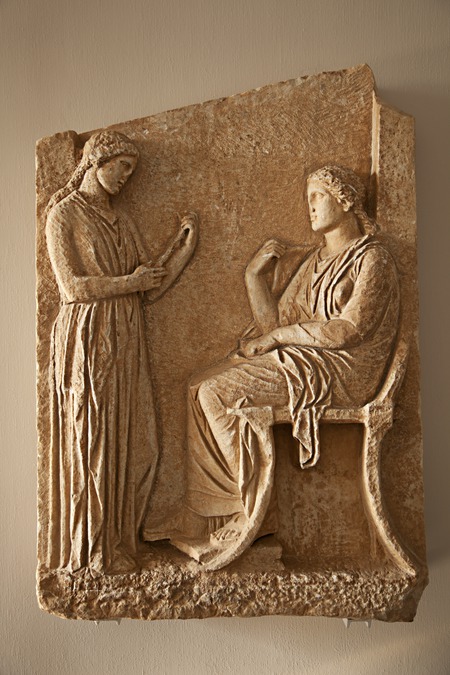Grave relief
Summary
The relief is made of Pentelic marble; white, fine grained marble with a very strong red patina. Overall the relief seems unfinished, and the background has criss-cross traces of tooth chisel. The relief has been examined with Visible Induced Luminescence, showing pigments (Egyptian Blue) on the fingers, hair and face of the figures, and more sporadically on the background.
In 1994 a marble sample was taken from the relief for an isotopic analysis.
Description of object
The upper part is cut off in an oblique line. The relief seems unfinished. The left antae is more rough than the right, and the right arm and shoulder of the standing girl is worked in the same manner as also her left knee. The back og the klismos runs into the right ante. The background shows criss-cross traces of tooth chisel.
To the right a woman is sitting on a klismos with her feet on a stool. She wears a chiton and himation and sandals on her feet. With her right hand she holds the edge of her cloak. The left a standing girl wearing a peplos, open at the side, holds forth a wreath (?) or necklace.
Choice of methods
Visual examination
- Macroscopic
Technical imaging
- VIL
Marble identification method
- Isotopic analysis. Results: d13C, 2,819 - d18O, -5,273
Technical imaging
VIL: Tests show clear luminescend parts on the fingers, hair and face og both women. Also a few pigments are spread on the background.
Bibliography
F. Poulsen (1951), Catalogue of Ancient Sculpture in the Ny Carlsberg Glyptotek, Copenhagen, cat. No. 198.
M. Moltesen (1995), Catalogue. Greece in the Classical Period. Ny Carlsberg Glyptotek, Copenhagen, cat. No. 32.
- IN 1515
- Relief
- c. 360-350 B.C.E.
- Classical
- Pentelic marble
- Bought in 1896 in Athens.
- H. 121 cm.; W. 82 cm.; D. 12 cm. (above), 18 cm. (below)

